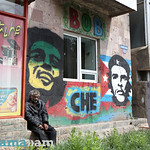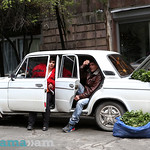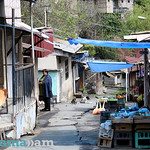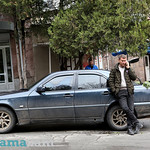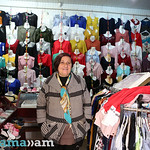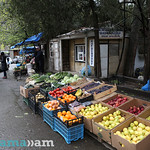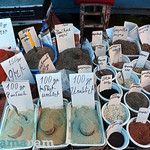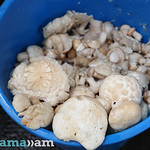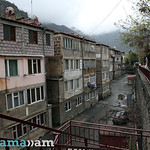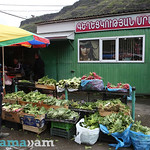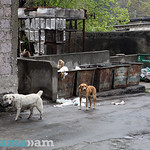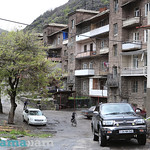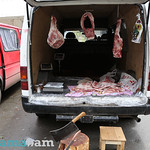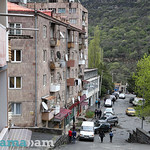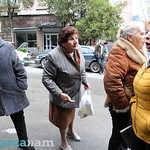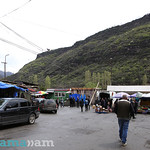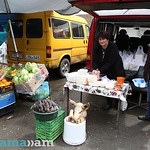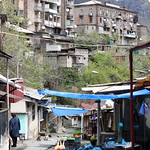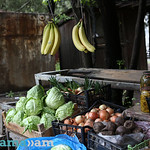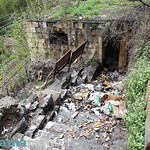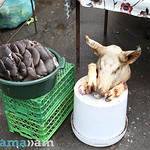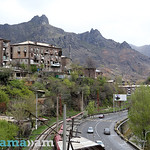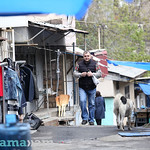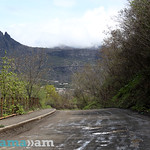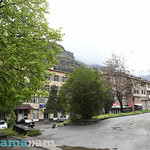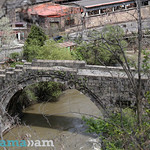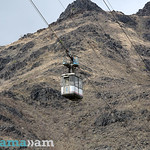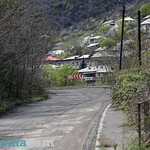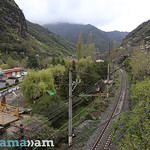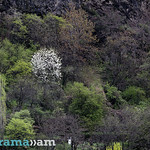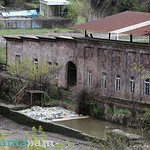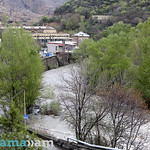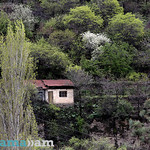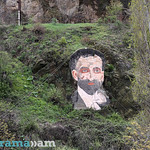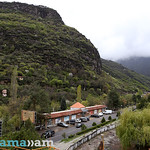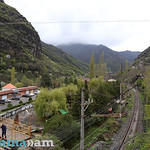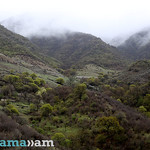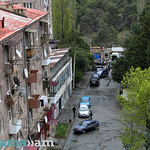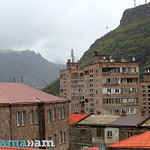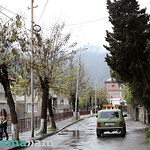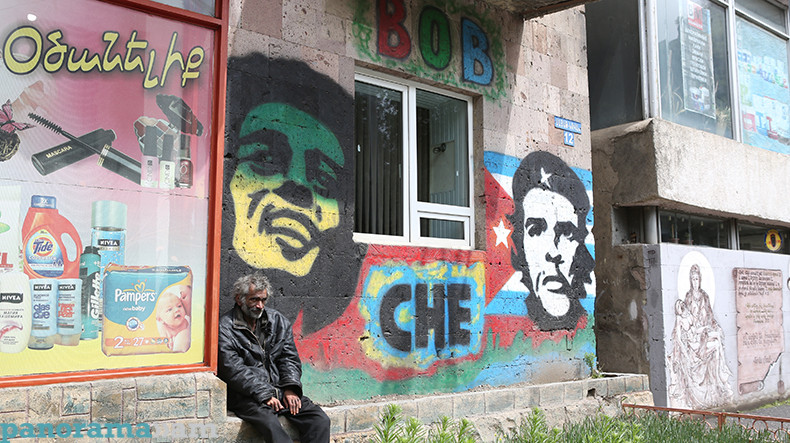
“Do not take photos when we are so sad” - Alaverdi has turned into a hungry place
“Your revolution has not arrived in Alaverdi,” a woman was shouting at my ears as I was talking to citizens in the market of Alaverdi, a small industrial town, on the hillsides of the Debed river canyon, in northeastern part of Armenia.
“Is it good or bad,”- I asked her and got the response: “Don’t we deserve a better life? Does the better life relate to you those living in Yerevan only?”
Another passer-by, who assumed I was a journalist from Yerevan, approached and said: “ The situation here is desperate with lots of criminals and drug addicts wandering through the streets… All this happens amid total inaction by police who never intervenes in brawls. There is no family in the town without a member with illness, no family without at least one relative suffering from cancer or a disability… people are living to only meet their deaths…No money, no jobs and the recent closure of the factory was the final thing to kill all our hopes.”
My interlocutor was referring to the closure of the copper smelting plant of the town amid the warnings of the environmentalists about the eminent threat to public health due to the emissions from the plant - a source of respiratory diseases and tumors.
“It was not closed down,” I corrected her, “The plant operation was ceased as the plant is expected to meet the standards put forward by the government. Alternative solutions are to be presented to prevent the risks of diseases.”
“That is lie. And the decision was not made to our benefit. Everything is about money and politics and no one has ever thought of us while operating and then closing the plant either. Otherwise they would install filters, would open something else before closing that. Authorities should take care of Alaverdi. The revolution has not reached Alaverdi yet,” she replied.
It might seem absurdity but both the closure and the complains about the closure of the plant seem legitimate. Air pollution levels in Alaverdi town of Lori region exceeds the limits of air-quality standards by 1.3 times, according to the data released by Armenia's National Statistical Service.
In 2009, the UN ordered research data showed the cancer and blood diseases dramatically grew in Alaverdi which is no coincidence. As environmentalist Inga Zarafyan says, the plant was given too much privileges. The company operating the plant was permitted to around 6,000 tons of sulfur dioxide emissions annually, while the actual volume of emissions totaled to 42,000. A few years ago flues were placed on the plant to diminish the emissions that even worsened the situation expanding the geography of the pollution. Environmentalist Karine Danielyan says the modern technologies allow to decrease the environmental damage yet those are quite expensive, and the company is not interested in buying them as its income will be notably reduced. “The problem can be solved principally yet a necessary will is required,” added Danielyan.
The situation was compounded in June 2018 when an the alert was received the plant of the Armenian Copper Programme ejected hazardous chemicals and contaminant that hang over the town. SOS Alaverdi initiative was established then.
The follow-up developments made the ACP company a daughter organization of Valex group cease the plant operation. The decision came after the environment agency of the government fined the company for,380 million AMD for violating the norms.
Alaverdi town was established as a center of copper plant and over the past 2.5 centuries has served as the industrial center of the country. The primary source of income for Alaverdi residents was directly linked to the copper plant. Following the closure of the plant, the residents blocked major highways leading to the town on several occasions. Today, the town is facing a major social-economic crisis. The government assures it takes every measure to re-operate the plant, however no progress has been made in following up the promise as the reasons for the closure of the plant are multilayered, while people need to live.
.jpg)
Robert, a resident of the town, is looking for a job, asks why all major plants in Kotayk and Armavir provinces operate, while their does not. He complains that his fellow residents are unemployed. “People are leaving the town after the closure of the mining plant. Despite all the defects and adverse health effects people need to work to make living. Some argue the number of drug addicts have rose which might be a result of a hard life.”
.jpg)
Marine, who sells greens at the town market, says she is trying to convince herself she is employed yet in the reality she suffers losses. “My brother transfers money from abroad. I buy the goods at 50 AMD and try to sell at a higher price. At the end, I throw everything as the town is dead. I am an educated woman, graduated the Polytechnical University and is specialized in production technology. To me, if the plant resumes operation with necessary installments, like filters, it will breathe a the new life to the aging town with belief in the future,” said Marine.
.jpg)
Armenuhi, who runs a boutique in a clothing market, does not even switch on the lights of the shop every morning when she comes to work. She sits outside the shop until it is darkened. She has thrown away the list of debtors. No one has money for bread not to speak about clothing,
“What can I do else. When the plant stopped working no one enters the shop. Most of them left for Russia seeking a better life. Only those who are unable to leave remain. I have obtained neurosis because of this situation, and my only hope is about the operation of the plant,” she said.
One of her colleagues interrupted her: “Is there cancer in Yerevan or elsewhere? My relative lives in the States and assures it is quite commend there as well. Should we blame our plant for that?” Noticing the camera, she remarked: “One should not get photos when being so sad. Please, do not take photos when I am so sad and the life is so desperate. Alaverdi has turned into a hungry place.”
.jpg)
Nina, an elderly woman who had been selling bread for 45 years, said she had lived long and seen much both the good and the bad. She has seen hungry families in need of bread , yet believes the situation will turn around sooner or later. “We will find a way out and will live. Everything will be ok,” she said.
The head of Alaverdi community Sasun Khechumyan believes the problem is that the town has always been an industrial center and all infrastructure and programs have been adjusted to the copper plant. “From the beginning it was wrong to connect the development of the area and the population with one specific industrial direction, since now we face this psychological and financial situation. 630 people out of the total number of Alaverdi residents have worked in the plant who are now potentially unemployed people. Another 400 people are unemployed as Teghut mine stooped its operation,” said Khechumyan.
The head of the community raises questions about reprofiling of the town and the residents’ occupation which requires not only resources and time but also convincing people.
“The largest rive of the country flows through our region. Georgia is next to us. Working through tourism and information companies we could attract tourists from there as well. It is true that a European will hardly visit Lori as a tourist, but when they are in Georgia, they may make use of the opportunity to come and see Lori. Alpine skiing is another potential the region could boost. The highest peak is 2543 meters long which opens the panorama of Tbilisi. Monasteries of Haghpat and Sanahin which are recognized as UNESCO World Heritage sites, Sanahin bridge, monasteries of Khorakert, Khuchap are all in Lori. The climatic conditions are also favorable for accepting tourists throughout the year. In other words there are every opportunity to develop the region. We should just psychologically get prepared for receiving tourists and provide a high quality service so that they return and tell others about Lori and its beauties,” dreamed the head of community.
Newsfeed
Videos





